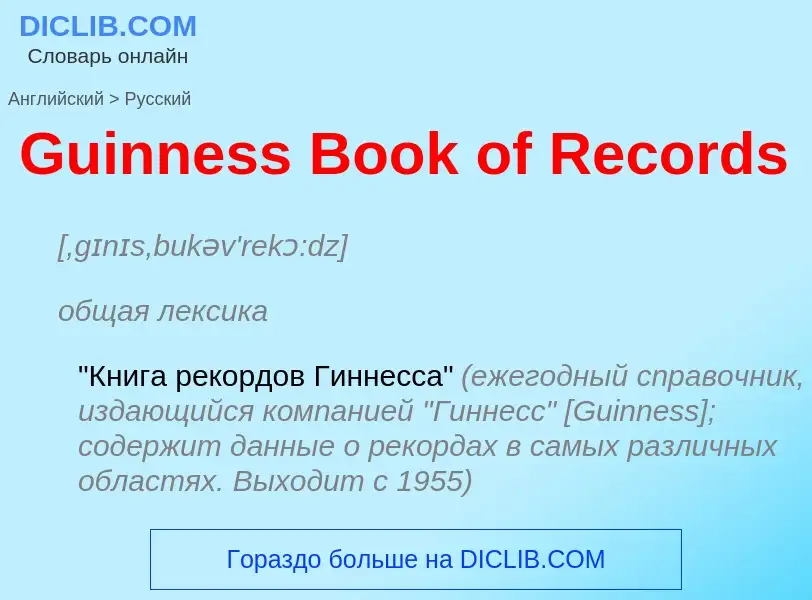Translation and analysis of words by ChatGPT artificial intelligence
On this page you can get a detailed analysis of a word or phrase, produced by the best artificial intelligence technology to date:
- how the word is used
- frequency of use
- it is used more often in oral or written speech
- word translation options
- usage examples (several phrases with translation)
- etymology
Guinness Book of Records - translation to English
[,gɪnɪs,bukəv'rekɔ:dz]
общая лексика
"Книга рекордов Гиннесса" (ежегодный справочник, издающийся компанией "Гиннесс" [Guinness]; содержит данные о рекордах в самых различных областях. Выходит с 1955)
['gɪnɪs]
общая лексика
"Гиннесс" (фирменное название крепкого тёмного пива производства одноимённой ирландской компании)
существительное
общая лексика
крепкий ирландский портер
Definition
Wikipedia
Guinness World Records, known from its inception in 1955 until 1999 as The Guinness Book of Records and in previous United States editions as The Guinness Book of World Records, is a reference book published annually, listing world records both of human achievements and the extremes of the natural world. The brainchild of Sir Hugh Beaver, the book was co-founded by twin brothers Norris and Ross McWhirter in Fleet Street, London, in August 1955.
The first edition topped the best-seller list in the United Kingdom by Christmas 1955. The following year the book was launched internationally, and as of the 2022 edition, it is now in its 67th year of publication, published in 100 countries and 23 languages, and maintains over 53,000 records in its database.
The international franchise has extended beyond print to include television series and museums. The popularity of the franchise has resulted in Guinness World Records becoming the primary international authority on the cataloguing and verification of a huge number of world records. The organisation employs record adjudicators to verify the authenticity of the setting and breaking of records. Following a series of owners, the franchise has been owned by the Jim Pattison Group since 2008, with its headquarters moved to South Quay Plaza, Canary Wharf, London in 2017. Since 2008, Guinness World Records has orientated its business model toward inventing new world records as publicity stunts for companies and individuals, which has attracted criticism.

![The North Beach ([[Nazaré, Portugal]]), listed on the Guinness World Records for the biggest waves ever surfed The North Beach ([[Nazaré, Portugal]]), listed on the Guinness World Records for the biggest waves ever surfed](https://commons.wikimedia.org/wiki/Special:FilePath/Can you see the surfer? (33988985575).jpg?width=200)

.jpg?width=200)

![Japanese competitive eater [[Takeru Kobayashi]] with two Guinness World Record certificates Japanese competitive eater [[Takeru Kobayashi]] with two Guinness World Record certificates](https://commons.wikimedia.org/wiki/Special:FilePath/Kobayashi Takeru, Japanese competitive eater 2.jpg?width=200)

![Ross]] at 107 [[Fleet Street]], London, in August 1955 Ross]] at 107 [[Fleet Street]], London, in August 1955](https://commons.wikimedia.org/wiki/Special:FilePath/Norris McWhirter (1977).jpg?width=200)
![Advertisement in [[Ballyshannon]], [[County Donegal]], Ireland Advertisement in [[Ballyshannon]], [[County Donegal]], Ireland](https://commons.wikimedia.org/wiki/Special:FilePath/Ballyshannon-30-Market Str-Guinness 2a-2017-gje.jpg?width=200)



![A Guinness counter mount and tap in a [[Johannesburg]] pub A Guinness counter mount and tap in a [[Johannesburg]] pub](https://commons.wikimedia.org/wiki/Special:FilePath/GuinnessTapJHB.jpg?width=200)

![[[Guinness Brewery]] in [[Dublin]], Ireland [[Guinness Brewery]] in [[Dublin]], Ireland](https://commons.wikimedia.org/wiki/Special:FilePath/Guinness Brauerei in Dublin, Irland (22138993785).jpg?width=200)




![Advertisement in [[Sierra Leone]], 1968 Advertisement in [[Sierra Leone]], 1968](https://commons.wikimedia.org/wiki/Special:FilePath/Part of a 1968 advertising sheet for Guinness after they established a brewery in Sierra Leone (West Africa) (1727997539).jpg?width=200)

